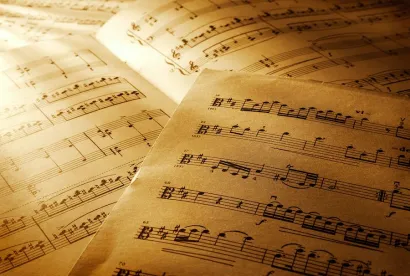A track called “Heart on My Sleeve” went viral recently on social media with lead vocals sounding eerily similar to a certain crooner known for his lovelorn lyrics. The pantomimed artist was Drake, no stranger to thirsty pining, backed by R&B artist The Weeknd. The song, however, was credited to Ghostwriter977, the alias of an anonymous TikToker, and neither Drake nor The Weeknd participated in the track’s creation. Rather, the vocals were generated using artificial intelligence tools.
AI-generated music – adopting the vocal styles of popular musicians – has become ubiquitous on TikTok and other social media platforms, racking up millions of views and listens. Much of the music is gimmicky—a rapper singing a shoegazer ballad or the theme song to an anime. But Heart on My Sleeve was impressively convincing, which has suggested to many that Ghostwriter977 is a sophisticated user of producer tools and programs, not just some “kid in the basement.” Consequently, many listeners believed the track was authentic Champagne Papi (one of the numerous nicknames for Drake) and the track began to spread virally. Given that Drake and The Weeknd used to regularly team up but their collab has gone dormant, it even seemed like a welcome bit of fan service.
The AI-generated track, however, was not so welcome to Universal Music Group, the record label representing Drake and The Weeknd.
Enter copyright. Everyone’s favorite gun to take to an Internet knife fight. It appears that the beat and lyrics (sung with an AI trained on Drake) were original to Ghostwriter977, but the songwriter inadvertently left in a small snippet of copyrighted music belonging to UMG in the form of a “producer tag.” This is like a watermark that a producer can place in their song to detect copying. It’s not surprising that it would appear in the AI version given the AI was trained on copyrighted examples. But unlike the Getty Images watermarks that appeared – albeit somewhat wonky and blurry – on images produced by the art generator Stable Diffusion, a casual listener of Heart on My Sleeve would have never known the “producer tag” was there, or that there was any copying.
With this verifiable copying of copyrighted music owned by UMG, the company was able to issue a Digital Millennium Copyright Act (DMCA) takedown to the platforms hosting the song. Platforms are generally receptive to these takedowns, lest they risk losing their safe harbor and become liable for infringement themselves. The song was removed from the platforms, but of course you can still find it online.
The dust-up led many to ask: What rights do artists and copyright holders have when an AI is training on their work? That is, what if the next Ghostwriter977/AI does not make the same mistake of leaving a producer tag in the finished product? What has Ghostwriter977/AI actually infringed and, moreover, is AI art copyrightable?
Copyright law gives copyright owners the exclusive right to reproduce, distribute, perform, and display their works, and to create derivatives of those works. The Copyright Office has equivocated somewhat in its determination that AI-generated art is not protectable. In a recent Statement of Policy, the Office said that copyright will only protect aspects of the work that were judged to have been made by the authoring human, resulting in partial protections of entire works. So, althoughGhostwriter977 may have written the words and the beat to Heart on My Sleeve, he or she probably could not obtain a registration for the finished product.
If an AI can’t obtain a registration, can it (or perhaps those who are using it) infringe one? Copyright holders have been in an uproar across multiple industries, arguing that it infringes their rights for AIs to train on their content without their permission. Getty Images is suing the makers of the art generator Stable Diffusion over its copying of millions of images protected by copyright. Online publishers are similarly arguing that chatbots that train on their content infringe their copyrights, and that they should be compensated accordingly.
But if the producer tag hadn’t been on the song, it would not have been clear (1) what the AI that generated Heart on My Sleeve had actually copied and (2) consequently, whether UMG could have successfully taken the song down through DMCA notices. Copyright doesn’t lend itself to protection for an artist’s voice or style. Indeed, copyright protects expressions of ideas that are fixed in a tangible medium and nothing more. So, copyright is not well suited to protecting one’s voice “generally.”
A better fit might be right of publicity, governed by state law, with state legislation in California and other states saying that a musical impersonation of a famous musician is a violation of their rights. The AI here is clearly mimicking Drake’s Ontario tenor with Patois inflection and The Weeknd’s signature falsetto. But for right of publicity violations, there is no immediate and efficient enforcement mechanism like there is with the DMCA and copyright claims. Rights holders would have to file a lawsuit in state court, a slow process that likely won’t be resolved before the damage is done, or seek a preliminary injunction, a costly process. Of course, platforms may still react to take down requests based on the right of publicity, but they do not face the same immediate consequences as they would for ignoring a DMCA notice.
Promoting the track using Drake or The Weeknd’s names would likely run afoul of trademark law, given that consumers could be confused as to the source of the music. But trademark enforcement also does not have a handy takedown mechanism like the DMCA. There is a trend towards platforms processing trademark takedown requests stylized like DMCA takedown notices. However, to do so is optional and without consequence like the DMCA loss of safe harbor.
How the law will play out may ultimately turn on how record labels and artists react. For example, Fairycore artist Grimes has invited artists to make new music using an AI-generated version of her voice, provided you split the royalties that the track generates with her 50-50. On the other hand, the traditional record labels are likely to oppose the use of AI-generated songs that mimic their artists.
There will surely be growing pains as law and policy catch up to technology. Art and technology are interdependent, and many advances looked like cheating when they were first introduced. Take the Napster shake up of the 2000s; the industry had to adapt to file sharing. Whether or not you think the streaming platforms of the digital world are a benefit to labels, artists or music, trying to stop the bleeding doesn’t work, as consumers want convenience.
Even if new technology arguably infringes IP rights, it’s not always so deleterious. The Hockney–Falco thesis claims that advances in realism and accuracy in Western art since the Renaissance were primarily the result of new optical technology such as the camera obscura, rather than mere development of artistic technique and skill. Some say tools like Stable Diffusion are simply new instruments stoking the flame of creativity. We could be DMCAing the next DaVinci!
Moreover, it’s not clear if AI-generated music and art truly does usurp the market for the original. AI’s can do a lot of things even better than humans, but to really capture the joy and pain of life, you probably have to actually live it.




 />i
/>i

